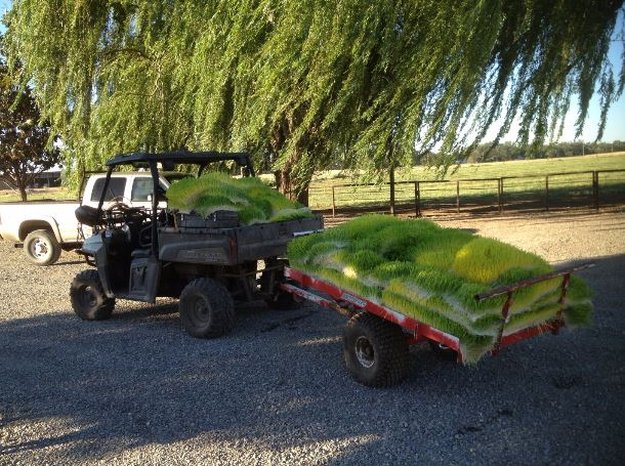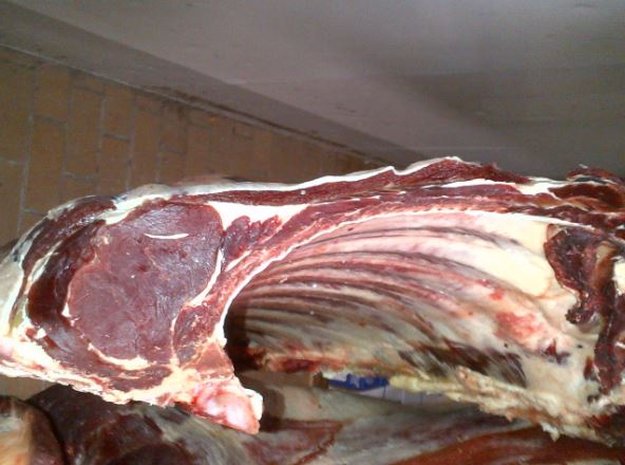What are the benefits of grass fed beef? What does grass fed mean? Why is grass-fed better? This article explains why your livestock needs a grass-fed diet for the utmost health.
Why Your Livestock Need a Grass-Fed Diet
There are many different ways to feed your livestock. You can choose from grain, hay, silage, minerals, supplements, and virtually endless combinations of them. Commercial dairies actually use specially designed computer programs and automated equipment to feed each cow a specific ration based on the amount of milk they produce. It can all be extremely high tech – but is that the best scenario for your homestead? Probably not.
Sustainability
With a grass-fed diet you rely primarily on your pasture and natural resources for your livestock’s sustenance. This requires one to be a good steward of the land so it will be preserved for many years to come. Good practices with range management and water conservation can lead to a low maintenance operation that will often last for generations.
Livestock Health
Studies show that grass-fed beef is more nutritious. Panorama meats is a major provider of Organic, Grass-Fed Meats. They supply grocery stores around the country, including a little one you may have heard of called Whole Foods Market. According to their information, “Compared with grain-fed beef, Panorama contains 60 percent more omega-3, twice as much vitamin A and E, three times more conjugated linoleic acid, and a higher concentration of unsaturated fats (the good ones) versus saturated fats (the bad ones).” This health is good for the animals, and those that consume them. More specific and scientific information can be found on Chico State Unviersity’s “All Things Grass fed” page. As a homesteader your livestock may have names and be treated like pets, but let’s face it, they have names like “Breakfast”, “Lunch” and “Dinner”.
How To Maintain a Grass-Fed Diet
Grass fed sounds great, it can be natural, organic, and produces healthier meat. But what if there’s no grass? There may be times of the year when additional supplementation is required to keep your livestock thriving. Remember Panorama meats? They have ranches all over the western U.S. Many of these ranches have adopted a new technology to keep their production up. They are using hydroponically grown sprouts as supplementation when the pastures are down. This extends the rangeland further into the dry season, and maintains the grass-fed status of the meat.

Sprouts, or Fodder, have been approved by the AGA (American Grassfed Association). Not only are the sprouts a good substitute, but they may actually enhance the health quality even further. Research is currently underway at Thompson Rivers University to test both beef and dairy quality in grass-fed and sprout-fed diets. With the addition of sprouts, the grass-fed movement is getting a boost in production. Currently there is not enough grass-fed meat to match the demand.

How to Grow Sprouts on Your Homestead
Shayn Bowler of Utah Natural Meat is an excellent example of how to implement this on your farm. He does things the old fashioned way, using draft horses to pull a plow instead of a tractor, and selling all of his products to locals. Sprouts have made themselves a daily part of his routine. You can check out the Utah Natural Meat website for a detailed description of his feeding practices, and a video of his sprouting process.
It’s healthy, but does it taste good?
It’s a fact of life that the healthiest things for us may not always be the tastiest. I’m sure there’s an exception for bacon somehow… But is that true with a grass based diet? I don’t think so. Starbar ranch in Arizona raises organic beef and pork. The meat is processed and tested by the University of Arizona, and sold at the local farmer’s market. The sheer tests performed on the meat show incredible tenderness. That’s right, a university actually scientifically tests the tenderness of their cuts. Fortune Beef also use a grass-based diet with sprouts. Listen to what the producer, the butcher and the chef have to say in this video.
There’s not much to say after watching that! If you have any questions about sprouts in particular, contact the experts over at Fodder Works.

Leave a Reply